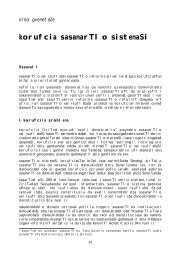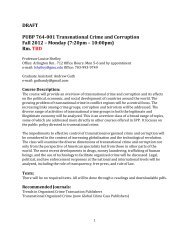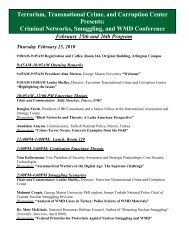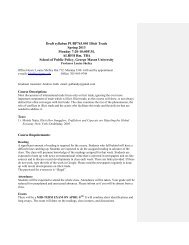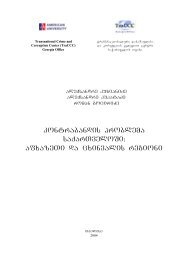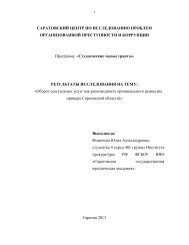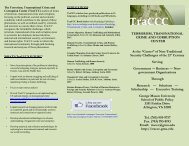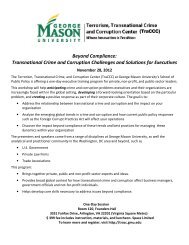Event Write Up - Terrorism, Transnational Crime and Corruption ...
Event Write Up - Terrorism, Transnational Crime and Corruption ...
Event Write Up - Terrorism, Transnational Crime and Corruption ...
You also want an ePaper? Increase the reach of your titles
YUMPU automatically turns print PDFs into web optimized ePapers that Google loves.
Asian Perspectives on <strong>Transnational</strong> <strong>Crime</strong> <strong>and</strong> Human Trafficking<br />
Tuesday, April 19, 2011-Arlington, VA<br />
The <strong>Terrorism</strong>, <strong>Transnational</strong> <strong>Crime</strong> <strong>and</strong> <strong>Corruption</strong> Center (TraCCC) welcomed four<br />
distinguished visitors to George Mason University on April 19, all of whom are currently<br />
Visiting Fellows from the Center for Northeast Asian Policy Studies at the Brookings Institution.<br />
Following opening remarks by former Republic of Korea Ambassador Ho-Jin Lee, the first<br />
panelist, Nelson Yiu-mo Cheng, made his presentation. A deputy district comm<strong>and</strong>er of the<br />
Eastern District in the Hong Police Force, Mr. Cheng introduced the audience to his comparative<br />
work on money-laundering investigations in the U.S. <strong>and</strong> Hong Kong. Mr. Cheng found that<br />
money laundering laws in the U.S. are restrictive compared to those of Hong Kong, while the<br />
asset forfeiture regime in the U.S. is very comprehensive compared to that of Hong Kong. While<br />
noting that collaboration has improved between financial intelligence units <strong>and</strong> law enforcement<br />
agencies in the U.S. <strong>and</strong> Hong Kong, Mr. Cheng asserted that exp<strong>and</strong>ing international<br />
cooperation on money laundering cases remains a challenge for both.<br />
Shen Haimei, a professor of anthropology at Yunnan University’s Anthropological Research<br />
Institute, then spoke about migration patterns into <strong>and</strong> from China, trafficking of women across<br />
the Yunnan-Myanmar border, <strong>and</strong> China’s immigration policy. Dr. Shen described China’s<br />
transition over the last decade from source of immigrants to a destination country for<br />
international migrants seeking business <strong>and</strong> labor opportunities. Noting that China’s “One<br />
Child” policy has resulted in a severe shortage of women, Dr. Shen pointed out the important<br />
role of female immigrants in China’s labor <strong>and</strong> marriage market. Foreign brides brought in or<br />
smuggled in from North Korea, Vietnam, Myanmar, Laos, <strong>and</strong> elsewhere pose a challenge to<br />
China’s current immigration law <strong>and</strong> policy, since Chinese authorities have had little experience<br />
in the administration of international immigrants. Increases in dem<strong>and</strong>s for foreign brides, both<br />
legal <strong>and</strong> illegal, has resulted in increases in human trafficking across the China-Myanmar<br />
border, which has become the main corridor for human trafficking in the Greater Mekong<br />
Subregion.. Finally, Dr. Shen discussed how women are arriving in southern China from<br />
Myanmar due to that country’s repressive military regime <strong>and</strong> the free trade zone in Yunnan<br />
province, as well as China’s comparatively attractive welfare policies <strong>and</strong> equitable economic<br />
development practices.<br />
The next speaker was Ta Minh Tuan, associate professor <strong>and</strong> deputy director of the Center for<br />
Foreign Policy <strong>and</strong> Regional Studies at the Diplomatic Academy of Vietnam. Dr. Tuan’s talk<br />
focused on how geography is to blame for the proliferation of transnational crime in Southeast<br />
Asia, as porous borders <strong>and</strong> limited state resources present immense challenges. In particular,<br />
Dr. Tuan noted that human trafficking, drug trafficking, arms smuggling, piracy, cyber crimes,<br />
<strong>and</strong> financial crimes continue to present problems for Southeast Asia. However, Dr. Tuan<br />
highlighted how the Association of Southeast Asian Nations (ASEAN) has demonstrated that<br />
high-level cooperation can bring results in the fight against transnational crime.<br />
S<strong>and</strong>y Yu-Lan Yeh, an associate professor in the department of Foreign Affairs Police at the<br />
Central Police University in Taiwan, was the event’s final speaker. Dr. Yeh discussed her<br />
extensive research on human trafficking in Taiwan, which is a significant destination for human
trafficking victims. Taiwan is a magnet country for human trafficking <strong>and</strong> other crimes due to<br />
the fact that many countries do not have diplomatic relations with Taiwan, which has made<br />
international cooperation problematic in terms of follow-up investigation <strong>and</strong> prosecution of<br />
transnational traffickers. Dr. Yeh also noted how traffickers abuse foreign worker permits to<br />
traffic sex workers <strong>and</strong> laborers into Taiwan. Taiwanese authorities, according to Dr. Yeh, have<br />
been responsive to international pressure on human trafficking issues, especially through the<br />
U.S. Department of State’s Trafficking in Persons (TIP) annual report. Taiwan’s recent efforts<br />
<strong>and</strong> achievements in addressing human trafficking through a series of anti-human trafficking<br />
reforms were recognized as Taiwan was identified as the strongest Tier 1 jurisdiction in the Asia<br />
Pacific Region in the 2010 TIP Report. At the same time, Dr. Yeh argued that public awareness<br />
of human trafficking remains relatively low in Taiwan <strong>and</strong> greater political will is needed to<br />
move forward in combating this serious problem.



